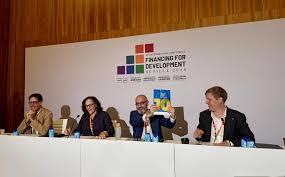
https://www.oecd.org/en/about/news/press-releases/2025/07/tax-inspectors...
Tax Inspectors Without Borders 2.0, presented during the Fourth International Conference on Financing for Development (FFD4), in Sevilla, Spain, will build on a decade of impactful collaboration between OECD, UNDP and governments worldwide while adapting its activities to the evolving challenges of international taxation. To date, the initiative has enabled countries to mobilise an additional USD 2.4 billion in revenue, of which USD 1.91 billion has been raised across Africa alone.
TIWB will continue its signature mission – the deployment of experienced tax experts to work side-by-side with domestic audit teams in developing countries, strengthening local capacity through real-time support in concrete audits and investigations. This distinctive model will continue to enhance technical skills while enabling developing countries to address complex tax issues, such as transfer pricing and base erosion and profit shifting.
As part of FFD4, TIWB was selected to be a part of the Sevilla Platform for Action, a group of initiatives aimed at achieving measurable progress by advancing the renewed financing framework of the Sevilla outcome document, supported by a set of concrete actions.
Mathias Cormann, Secretary-General of the OECD, welcomed the launch of TIWB 2.0: “Looking ahead, we are optimistic that the Tax Inspectors Without Borders initiative will continue to adapt and respond to each jurisdiction’s specific needs and objectives, delivering responsive, country-led support that will improve tax administrations and boost domestic resource mobilisation. With ongoing donor engagement and reinforced partnerships, TIWB 2.0 is positioned to help developing countries strengthen tax capacity and meet the demands of a rapidly shifting global tax environment.”
With TIWB 2.0, the initiative will deepen its commitment to tailored assistance and institutional strengthening, while expanding into new areas of support. This will include helping developing countries address key emerging challenges, such as the digitalisation of the economy, complex cross-border transactions and new drivers of illicit financial flows.
Haoliang Xu, Acting Administrator of UNDP, said: “Over the past decade, Tax Inspectors Without Borders has shown how strengthening tax capacity at the national level unlocks domestic finance for sustainable development. By providing technical expertise in tax administrations, TIWB has helped countries reclaim billions to advance the Sustainable Development Goals. When tax systems are fair, efficient, and inclusive, they do more than fund public services, they rebuild trust, strengthen the social contract, and weave sustainability into the fabric of governance. But we need to scale up. Continued investment in TIWB will be essential to sustain this momentum and mobilise domestic resources to advance sustainability.”
The new developments were presented at FFD4 in Sevilla during an event, “Tax Inspectors Without Borders: A Decade of Impact and the Road Ahead”, together with partners from the OECD’s Forum on Tax Administration (FTA), the African Tax Administration Forum (ATAF), the Intergovernmental Forum on Mining, Minerals, Metals and Sustainable Development (IGF), and the International Centre for Tax and Development (ICTD).
Commissioner Edward Kieswetter of South Africa, Vice-Chair of the OECD FTA, which brings together over 50 of the world’s leading tax administrations, also attended the event, highlighting the vital role tax administrations play in supporting TIWB programmes through the provision of world-class experts. These strategic partnerships will be scaled up under TIWB 2.0, enhancing triangular co-operation and expanding engagement with international and regional institutions.
Since its launch in 2015, TIWB has supported 70 developing jurisdictions, securing USD 6.39 billion in tax assessments, including disallowed losses and deferred taxes, and collecting over USD 2.4 billion in additional tax revenues. In Africa alone, through its close collaboration with ATAF, 39 countries have raised more than USD 1.9 billion in additional revenues.
A 10-year retrospective report outlining these results and the initiative’s future direction was launched today, capturing a decade of achievements and lessons learned.
To read the full progress report and find out more about TIWB, visit: https://read.oecd.org/10.1787/e9762366-en.
For further information, journalists are invited to contact Lawrence Speer at the OECD Media Office (+33 1 45 24 97 00) or Victor Garrido Delgado, at the UNDP Media Office.
Working with over 100 countries, the OECD is a global policy forum that promotes policies to preserve individual liberty and improve the economic and social well-being of people around the world.









